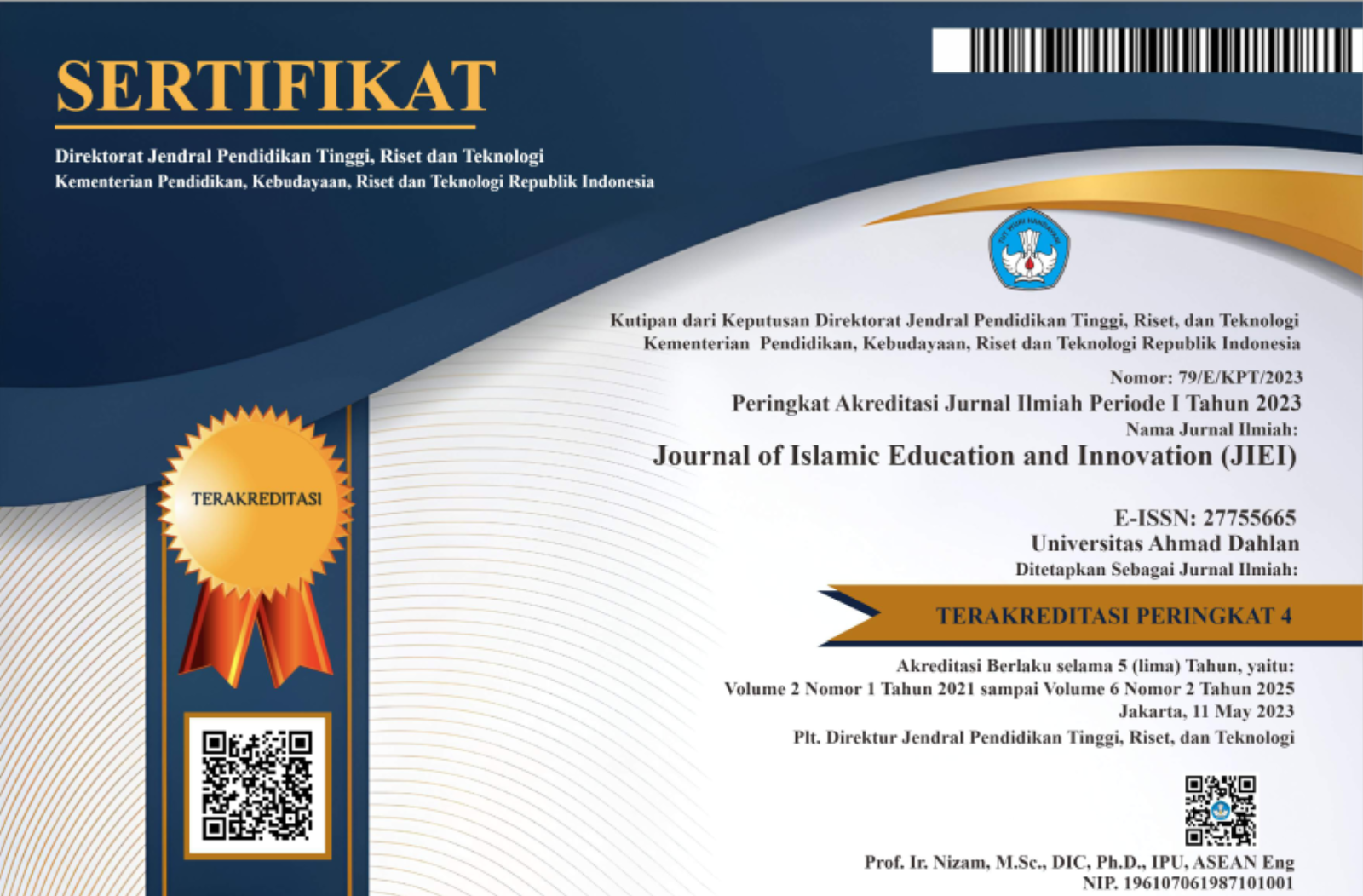Nilai-nilai filosofis dalam pendidikan agama islam
DOI:
https://doi.org/10.26555/jiei.v1i2.3384Keywords:
Nilai-nilai Filosofis, Filsafat Ilmu, Pendidikan IslamAbstract
Artikel ini bertujuan untuk mendalami pengaruh filsafat ilmu dalam pendidikan agama Islam. Filsafat ilmu adalah kajian komprehensif terkait pondasi ilmu, dalam artikel ini adalah ilmu mendidik agama Islam. Proses untuk menyibak pondasi ilmu tersebut dilakukan melalui tiga hal, pertama, secara ontologi; kedua, epistemologi; Ketiga, aksiologi. Metode yang dipakai dalam penulisan artikel ini adalah kualitatif dengan pendekatan deskriptif dalam melihat secara filosofis Pendidikan Agama Islam. Pendidikan agama Islam secara filosofis adalah proses pembimbingan secara sadar seorang pendidik terhadap peserta didik agar unsur jasmaniah, rohaniah, intelektualitas, dan kemampuan lainnya dari peserta didik dapat bertambah dan semakin baik menuju terciptanya insan kamil yang tercermin dari individu, keluarga dan masyarakat yang mengusung nilai-nilai Islami.
References
T. L. Gie, Pengantar Filsafat Ilmu. Yogyakarta: Liberty, 2012.
J. S. Suriasumantri, Filsafat Ilmu: Sebuah Pengantar Populer. Jakarta: Pustaka Sinar Harapan, 2005.
Kuntowijoyo, Islam Sebagai Ilmu: Epistemologi, Metodologi, dan Etika. Jakarta: Teraju, 2004.
M. Tolchah, “Filsafat Pendidikan Islam: Kontruksi Tipologis dalam Pengembangan Kurikulum,” Tsaqafah J. Perad. Islam, vol. 11, no. 2, pp. 381–398, 2015.
Sugiyono, Metode Penelitian Kuantitatif, Kualitatif dan R&D. Bandung: Alfabeta, 2013.
E. K. Poerwandari, Pendekatan Kualitatif Untuk Penelitian Perilaku Manusia. Depok: LPSP3 Universitas Indonesia, 2005.
L. J. Moleong, Metode Penelitian Kualitatif, 36th ed. Bandung: Remaja Rosda Karya, 2017.
N. S. Sukmadinata, Metode Penelitian Pendidikan. Bandung: Remaja Rosda Karya, 2011.
Ismaun, Filsafat Ilmu. Bandung: Penerbit UPI, 2001.
S. Widyawati, “Filsafat Ilmu Sebagai Landasan Pengembangan Ilmu Pendidikan,” J. Seni Budaya, vol. 11, no. 1, p. 8, 2013.
H. M. Arifin, Filsafat Pendidikan Islam. Jakarta: Bumi Aksara, 2003.
A. Nata, Filsafat Pendidikan Islam. Jakarta: PT. Logos Wacana Ilmu, 2001.
A. H. Hermawan, Filsafat Pendidikan Islam. Jakarta: Departemen Agama Republik Indonesia, 2009.
O. M. A.-T. Al-Syaibani, Filsafat Pendidikan Islam, 1st ed. Jakarta: Bulan Bintang, 2003.
Mahmud and T. Priatna, Pemikiran Pendidikan Islam, I. Bandung: Sahifa, 2005.
Matpari, “Tipologi Pemikiran Pendidikan Islam: Membangun Paradigma Pendidikan Sebagai Wahana Pembinaan Dan Pengembangan Peserta Didik,” J. Stud. Islam, vol. 5, pp. 1–12, 2018.
A. Sahin, “Critical issues in islamic education studies: Rethinking islamic and western liberal secular values of education,” Religions, vol. 9, no. 11, 2018.
R. Rohinah, “Filsafat pendidikan Islam; Studi filosofis atas tujuan dan metode pendidikan Islam,” J. Pendidik. Islam, vol. 2, no. 2, p. 309, 2013.
H. H. Horne, The Philosophy of Education. Wisconsin: Book on Demand Ltd., 2014.
A. H. M. ibn M. Al-Ghazali, Ihya ’Ulumddin. Beirut: Dar el-Fikr, 1939.
F. Lahmar, “Islamic education: An islamic ‘wisdom-based cultural environment’ in awestern context,” Religions, vol. 11, no. 8, pp. 1–15, 2020.
A. ar-R. I. Khaldun, Muqaddimah Ibnu Khaldun. Beirut: Dar al-Kutub al-’Ilmiyah, 1993.
A. T. A. Putra, “Pemikiran Filosofis Pendidikan Ibnu Sina,” Lliterasi, vol. VI, no. 2, pp. 191–201, 2015.
Downloads
Published
Issue
Section
License
Copyright (c) 2020 Ifmawati

This work is licensed under a Creative Commons Attribution-ShareAlike 4.0 International License.
License and Copyright Agreement
In submitting the manuscript to the journal, the authors certify that:
- They are authorized by their co-authors to enter into these arrangements.
- The work described has not been formally published before, except in the form of an abstract or as part of a published lecture, review, thesis, or overlay journal. Please also carefully read the International JIEI Author Guidelines at http://journal2.uad.ac.id/index.php/jiei/about/submissions#onlineSubmissions
- That it is not under consideration for publication elsewhere,
- That its publication has been approved by all the author(s) and by the responsible authorities “ tacitly or explicitly “ of the institutes where the work has been carried out.
- They secure the right to reproduce any material that has already been published or copyrighted elsewhere.
- They agree to the following license and copyright agreement.
Copyright
Authors who publish with the Journal of Islamic Education and Innovation agree to the following terms:
- Authors retain copyright and grant the journal right of first publication with the work simultaneously licensed under a Creative Commons Attribution License (CC BY-SA 4.0) that allows others to share the work with an acknowledgment of the work's authorship and initial publication in this journal.
- Authors are able to enter into separate, additional contractual arrangements for the non-exclusive distribution of the journal's published version of the work (e.g., post it to an institutional repository or publish it in a book), with an acknowledgment of its initial publication in this journal.
- Authors are permitted and encouraged to post their work online (e.g., in institutional repositories or on their website) prior to and during the submission process, as it can lead to productive exchanges, as well as earlier and greater citation of published work.









